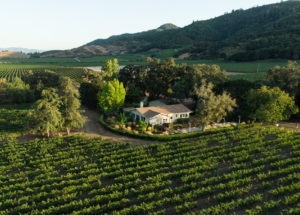Yountville was established in 1836 when Napa Valley legend George Yount received an 11,000-acre land grant from General Mariano Vallejo on behalf of the Mexican government. Yount soon became the first person to plant grapes in Napa Valley at the site of what is today the Napanook Vineyard. Where Yount led, generations of vintners followed, including Charles Hopper, who acquired 640 acres from Yount, which he began planting to winegrapes in 1877.
In 1975, almost 100 years after both sites were first planted to grapes, our founder, Bruce Markham, purchased our original estate properties in Yountville, the Yountville Ranch and Hopper House vineyards. Located next to Beckstoffer’s famed Missouri Hopper Vineyard, across the road from Vine Hill Ranch Vineyard, and separated from the Dominus Vineyard by our own Yountville Ranch, our 15-acre Hopper House Vineyard features 7.5 acres of Merlot and 5 acres of Cabernet Sauvignon planted in bale loam soils on the north side of Hopper Creek. With long, warm days, cool nights, and ideal soils, Hopper House Vineyard offers the perfect terroir for exceptional Napa Valley Merlot and Cabernet Sauvignon. Hopper House Vineyard is also home to a charming craftsman-style bungalow amid the vines that was once home to Bruce and his family and today serves as our guest house.
As the smallest of our four estate vineyards and a site that our Viticulturist Taylor Abudi calls “very friendly for farming,” Hopper House has become a proving ground for the use of new sustainable farming practices at Markham. In 2021 and 2022, as the vineyard’s old vines neared the end of their life cycle, we replanted Hopper House Vineyard. In addition to focusing on low-vigor and drought-tolerant rootstocks, our Winemaker Kimberlee Nicholls selected her favorite clones of Merlot and Cabernet Sauvignon. As part of the replant, our team also made the decision to farm the site without the use of any synthetic chemicals, and in 2023, Hopper House Vineyard earned organic certification from the California Certified Organic Farmers (CCOF). In addition to organic farming, we have also begun trialing several regenerative farming techniques at Hopper House.
Given the youthful age of our Hopper House vines, Taylor has been amazed by how quickly they are evolving. “Despite only being three or four years old, they are some of the healthiest young vines I have ever seen. Compared to other Napa Valley vineyards of the same age, the vines are already producing great canopies, and the early fruit sets have been amazing.” As these vines continue to grow and mature in quality, they will once again become an important part of our Marked Parcel Series and our acclaimed Hopper House Merlot. “We are proud of what we are doing at Hopper House,” adds Taylor. “Not only are we increasing soil health and building resiliency in the vines, we are doing what’s right for the environment. At the same time, we are ensuring that this historic vineyard will thrive for generations to come.”
